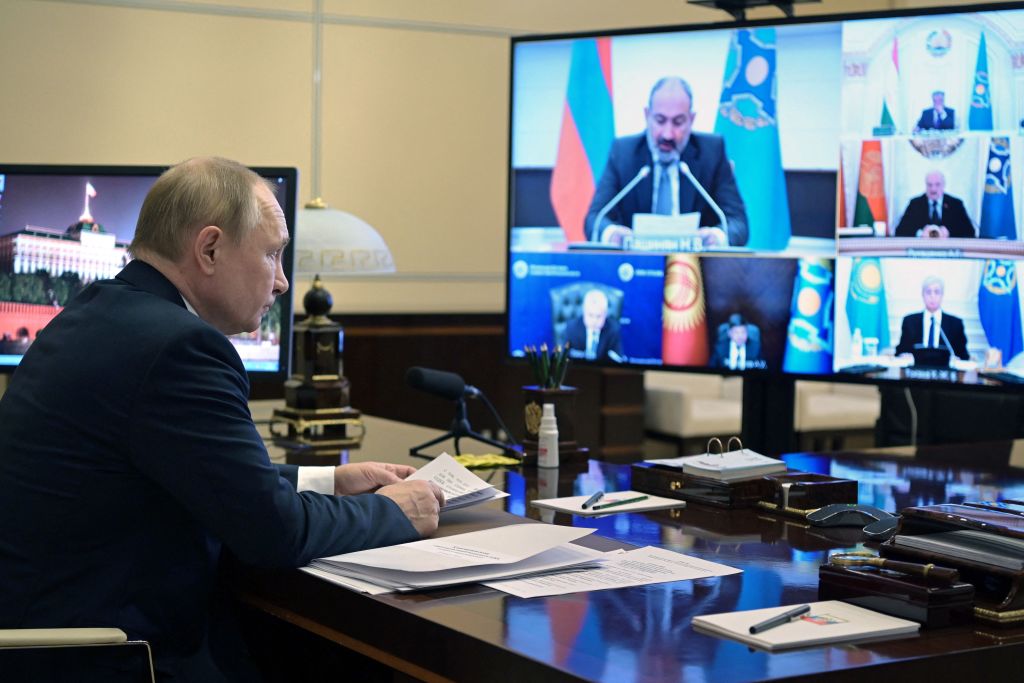Russian troops to begin withdrawal from Kazakhstan following deadly riots


A free daily email with the biggest news stories of the day – and the best features from TheWeek.com
You are now subscribed
Your newsletter sign-up was successful
Russian troops will begin leaving Kazakhstan Thursday, The New York Times reports.
In a Tuesday speech, Kazakh President Kassym-Jomart Tokayev said the withdrawal would take "no more than 10 days," meaning that all Collective Security Treaty Organization troops should out of the country by Jan. 23.
Around 2,500 CTSO troops, mostly Russians, arrived in the country Saturday to help quell riots that engulfed the nation after the government announced an increase in the price of liquified petroleum gas.
The Week
Escape your echo chamber. Get the facts behind the news, plus analysis from multiple perspectives.

Sign up for The Week's Free Newsletters
From our morning news briefing to a weekly Good News Newsletter, get the best of The Week delivered directly to your inbox.
From our morning news briefing to a weekly Good News Newsletter, get the best of The Week delivered directly to your inbox.
If Russian troops do in fact depart, it will assuage the concerns of many who suggested that Russian President Vladimir Putin might seize the opportunity to permanently increase his country's power over the former Soviet republic.
U.S. Secretary of State Antony Blinken warned that "once Russians are in your house, it's sometimes very difficult to get them to leave," and Andrew Higgins wrote in The New York Times that "such assistance is seldom offered free of charge."
Protesters, who also aired grievances against Kazakhstan's authoritarian political system, burned the presidential residence and stormed the country's largest airport. At least 26 demonstrators and 18 law enforcement officers were killed, an internet blackout was implemented, and more than 5,000 people were reportedly detained.
A former two-time prime minister was dismissed from his role as intelligence chief and charged with treason, and former President Nursultan Nazarbayev, the authoritarian leader who ruled Kazakhstan from its independence in 1991 until 2019 and remained influential behind the scenes, was removed from his powerful position on Kazakhstan's Security Council.
A free daily email with the biggest news stories of the day – and the best features from TheWeek.com
Grayson Quay was the weekend editor at TheWeek.com. His writing has also been published in National Review, the Pittsburgh Post-Gazette, Modern Age, The American Conservative, The Spectator World, and other outlets. Grayson earned his M.A. from Georgetown University in 2019.
-
 The ‘ravenous’ demand for Cornish minerals
The ‘ravenous’ demand for Cornish mineralsUnder the Radar Growing need for critical minerals to power tech has intensified ‘appetite’ for lithium, which could be a ‘huge boon’ for local economy
-
 Why are election experts taking Trump’s midterm threats seriously?
Why are election experts taking Trump’s midterm threats seriously?IN THE SPOTLIGHT As the president muses about polling place deployments and a centralized electoral system aimed at one-party control, lawmakers are taking this administration at its word
-
 ‘Restaurateurs have become millionaires’
‘Restaurateurs have become millionaires’Instant Opinion Opinion, comment and editorials of the day
-
 What is ‘Arctic Sentry’ and will it deter Russia and China?
What is ‘Arctic Sentry’ and will it deter Russia and China?Today’s Big Question Nato considers joint operation and intelligence sharing in Arctic region, in face of Trump’s threats to seize Greenland for ‘protection’
-
 What would a UK deployment to Ukraine look like?
What would a UK deployment to Ukraine look like?Today's Big Question Security agreement commits British and French forces in event of ceasefire
-
 Did Trump just end the US-Europe alliance?
Did Trump just end the US-Europe alliance?Today's Big Question New US national security policy drops ‘grenade’ on Europe and should serve as ‘the mother of all wake-up calls’
-
 Is conscription the answer to Europe’s security woes?
Is conscription the answer to Europe’s security woes?Today's Big Question How best to boost troop numbers to deal with Russian threat is ‘prompting fierce and soul-searching debates’
-
 Trump peace deal: an offer Zelenskyy can’t refuse?
Trump peace deal: an offer Zelenskyy can’t refuse?Today’s Big Question ‘Unpalatable’ US plan may strengthen embattled Ukrainian president at home
-
 Vladimir Putin’s ‘nuclear tsunami’ missile
Vladimir Putin’s ‘nuclear tsunami’ missileThe Explainer Russian president has boasted that there is no way to intercept the new weapon
-
 The Baltic ‘bog belt’ plan to protect Europe from Russia
The Baltic ‘bog belt’ plan to protect Europe from RussiaUnder the Radar Reviving lost wetland on Nato’s eastern flank would fuse ‘two European priorities that increasingly compete for attention and funding: defence and climate’
-
 How should Nato respond to Putin’s incursions?
How should Nato respond to Putin’s incursions?Today’s big question Russia has breached Nato airspace regularly this month, and nations are primed to respond
